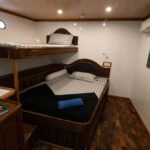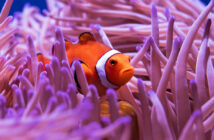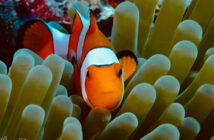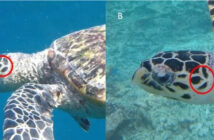Fragile Legacy is narrated by Ted Danson and merges science, art, history and marine conservation, whilst seeking out living examples of the bizarre and beautiful sea creatures that were captured as glass reproductions by the Blaschka family 160 years ago.

The Blaschkas
Leopold and Rudolph Blaschka were master glass artisans of the 19th century. Leopold (1822-1895) was becalmed for weeks during a trans-Atlantic sailing voyage and became intrigued by the jellyfish, squid and other marine life that he observed in the water. He painted and later created perfect glass replicas of these fantastic creatures. The models were made with a combination of clear and coloured glass, using techniques perfected by Leopold, joined later by his son, Rudolph (1857–1939).
Their work graces museum and university collections the world over. Corning Museum of Glass, (CMOG), is currently exhibiting Cornell’s collection and has compiled a digital map of Blaschka distribution. The digital map shows two collections were shipped to the South Island of New Zealand over a century ago.
In 1885 Andrew Dixon White, first president of Cornell University, authorized purchase of over five hundred Blaschka glass models of marine invertebrates for use in teaching marine biology. These exquisitely crafted models enabled study of delicate creature that could not be otherwise documented or well-preserved. With the advent of the aqualung and underwater filming, the Cornell Blaschka collection fell into disuse. It was forgotten until the 1960s, when a young faculty member exhumed the collection from beneath layers of dust and rushed them to the Corning Glass Museum for preservation.

Fast-forward to the present day
The timeless sea is changing, and scientists around the globe are struggling to understand the impact of alterations in ocean chemistry and temperature on marine life as human activities take their toll. Among the leaders in the effort to come to grips with environmental change is Dr. Drew Harvell, a marine biologist in Cornell’s Department of Ecology and Evolutionary Biology. She is also the Curator of the Cornell collection of Blaschka glass, overseeing their restoration and display.
Dr. Harvell and marine filmmaker David O. Brown are on a quest to film living examples of the inspirations for the Cornell Blaschka collection.
How many of the living creatures rendered in glass over a century ago still exist?
In the midst of massive extinctions triggered by pollution, over fishing and habitat loss, how have these ancient organisms fared?
The team are travelling to coastal areas in tropical and temperate waters, as well as mounting deep-sea expeditions to answer these questions and document the biodiversity found hundreds of miles from land. The resulting footage will provide a high definition chronicle of marine invertebrate life and explore which among these amazing organisms remain in the oceans today.
There is scientific consensus that the change in the oceans has just begun. The sea is warming and the very chemistry that enables many of these animals to exist is being fundamentally changed. As irreplaceable as the glass replicas are, the species upon which they are based are the product of millennia of evolution and carry genetic information that, if lost, can never be retrieved.
Having so far won “Best Short” at the Monaco Blue Ocean Film Festival and “Best Feature” at the LA New Media Festival, Fragile Legacy has also been accepted or invited into 16 festivals worldwide to date.











